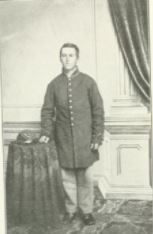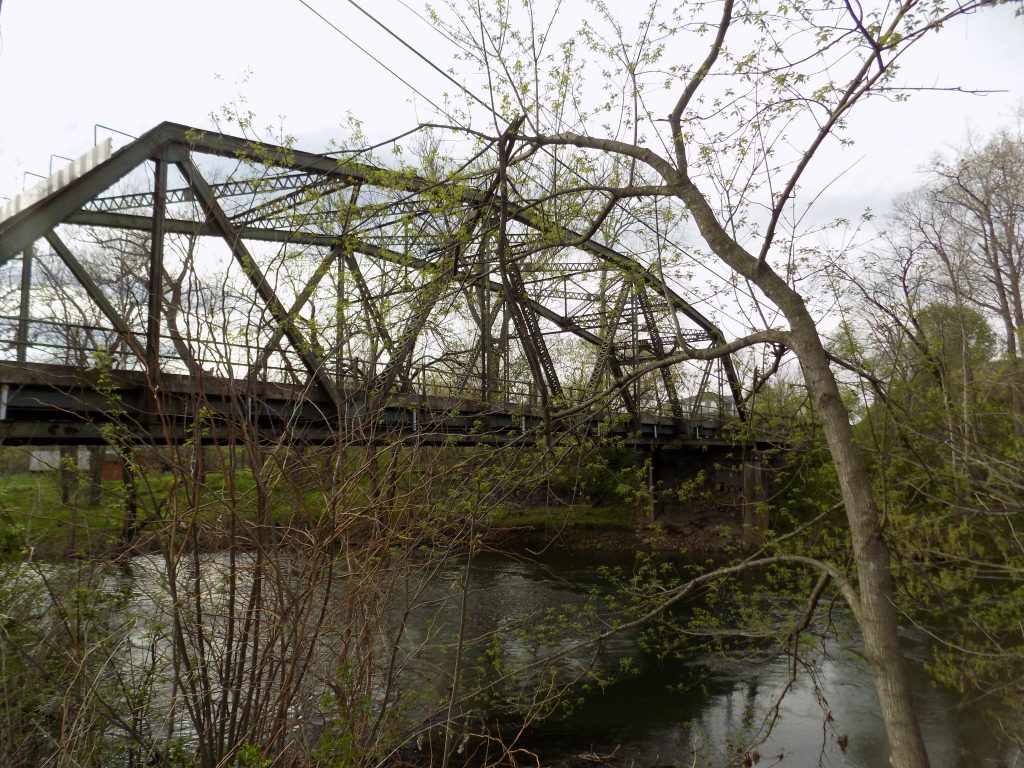Along The River: Corporal Lynch’s Summer Breaks

Charles Lynch’s diary is one of my favorites for a Union soldier’s perspective on infantry fighting in the Shenandoah Valley during 1864. He promoted to corporal after the Battle of Piedmont and served with the 18th Connecticut. It’s also one of the first journals that I’ve noticed a soldier taking time to record “wash day” and swimming/bathing whenever he gets a chance.
It’s been blazing hot this week in Virginia, and it seems like a good time to read about Civil War adventures along the river. From a water snake to tending the wounded near the river, diving for artifacts, fishing, and more, Charlie Lynch left us a glimpses of how he tried to stay cool and take a break from the war during the New Market, Lynchburg, and Monocacy Campaigns. Here are a few excerpts:
May 10th [1864, New Market Campaign]
Turned out early this morning. Orders to prepare for inspection and drill. Officers seem bound to keep us busy. This afternoon while enjoying a bath and a swim in Cedar Creek, felt something around my leg under water. It did not take long to pull the thing off, which proved to be a water snake. With a jump I was soon out of the water. My leg bled freely from a small wound. First thought that I had been bitten. No bad results coming from it, decided that the wound was made by a sharp stone….
June 1st [1864, near New Market, advancing in the Lynchburg Campaign]
In camp waiting for orders to advance. Skirmish drill during the forenoon. This afternoon went to the Shenandoah River. Gave my clothes a good washing, which they needed. Remained in the water, having a good bath and swim, until they were dry. It did not take long in the hot sun. No change of raiment for a soldier in the field. Managed to carry one extra pair of woolen stockings…

June 5th [1864, after the Battle of Piedmont]
…The day had been a long, hard one. We were under fire from 7 a.m. to 5 p.m. Sorrow came to us over our loss, but we must have something to eat in order to keep up. I carried several canteens over to the Shenandoah River, filled them. On my return I stopped to see a young wounded Confederate. Bathed his wound on his foot with the water from my own canteen. He thanked me kindly as he lay on the ground, patiently waiting for his turn to be cared for. After having rations I picked up a few blankets, visited the field hospital and covered our boys over with them, as the nights were cool. It was a sickening sight to me. No more desire to visit a field hospital after a battle. I made my way back to our company in the dark. Lay down on the battle field for the night, for rest and sleep. Dead and wounded around us.
June 6th [1864, marching on Staunton]
The scenery in this vicinity is grand. Town located on hills and hillsides. Reminds us somewhat of our home town, Norwich, Connecticut. We are soldiers, doing hard service for our country in a cruel war, but for all that we cannot help but take in the fine scenery. We are living close to the earth, as we eat and sleep on the ground. We try to improve every opportunity to take a bath, wash our clothes, and swim. At this time the weather is very hot, dry, and dusty, which seems to come very soon after the rains. Thunderstorms, in this valley, are very fierce at times.
June 13th [1864, near Lexington]
A hot morning. All is quiet. Gave my clothes a good washing, hanging them on the bushes to dry. A good swim and bath while waiting for them to dry. Dry quickly in this climate. No change of raiment, only one suit, we are in light marching order. A soldier’s life in the field is not always one of cleanliness, marching in the dust and dirt, wading brooks and rivers, sleeping on the ground.
June 24th [1864, heading toward White Sulpher Springs]
Did not have to hurry up this morning. After breakfast, orders were, we remain here for the day. I started out to find water where I could take a bath. While hunting for such a place, I met Sergeant Samuel Lee, Co A, who was on the same errand. Together we hunted for water through the lots. We were rewarded by finding a small brook with a deep hole, close to the foot of a high mountain. A good clean place. Water enough for a good bath but not for a swim. Remained in the water for a long time….
June 29th [1864]
A short distance from the Gauley River, on the bank of the Kanawah River, an ideal spot, camp was located…. Good water. Fine place for bathing. The Kanawah River was a clear as crystal. Plenty to eat, a chance to bathe, wash our clothes, rest, made a great improvement in our condition in a very short time…
June 30th [1864]
Up very early this fine morning. A good bath in the waters of the Great Kanawah. A good place to dry our clothes on the bushes. We remain in water for a long time. So refreshing and good. At this point a great battle had taken place when General Rosencrans drove the rebels out of West Virginia, who were under the command of General Robert E. Lee. The bed of the river was covered with shells, solid shots, pieces of exploded shells, and bullets. I never saw anything like it before. The battle took place the first year of the war. I have a bullet picked up from the bottom of the river by myself….
August 4th [1864, Monocacy Campaign]
Fine morning. Had an early swim in the good clean waters of the Monocacy River. Later hunted up some bait, sat under a large tree to try my luck at fishing. Always keep a hook and line by me. Had very good luck. Dressed the fish at the river, went back to the camp, cooked them, and shared the fish with the boys. Only trouble was, I did not have enough for all our company….
Source:
Lynch, Charles. This Cruel War: The Civil War Diary of Charles H. Lynch. (1915).
Nice to read, Sarah, especially since I went to law school in Lexington, and currently live in CT. The thunderstorms in the Valley can be fierce.
Is this Charles Lynch related to the Revolutionary War Charles Lynch whose family founded Lynchburg VA?
Hi Margie, I don’t know for sure. But this Charles Lynch was from Connecticut so I doubt a direct ancestry line?